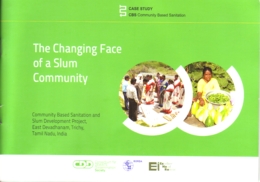Kategori Digilib
The Changing Face of a Slum Community: Community Based Sanitation and Slum Development Project, East Devadhanam, Trichy, Tamil Nadu, India

Joe D’Souza, dkk
CDD (Consortium for DEWATS Dissemination) Society – BORDA – Excellent Novel Radical, December 2009, 32 hal
Th. 2009
363.7 SOU c
studi kasus, community based sanitation, slum development project, sanitasi berbasis masyarakat, East Devadhanam - India, slum community
Perpustakaan AMPL, Telp. 021 - 31904113
2.154 kali
The movement of people into densely populated areas due to increasing urbanisation has resulted in increased risk to public health and hygine. Slums in urban areas are often defined as having lack of access to safe drinking water and poor sanitation systems with almost no household hygiene. Access to good sanitation facilities is a cause for concern, especially for those living in slums. Shrinking urban spaces make defecation difficukt and unhygienic. Most slum dwellers usually live without proper toilet facilities and it is women who suffer the most, as privacy is hard to come by during daylight hours.
East Devadhanam is also one such slum, located in a fringe area of Trichy in Tamil Nadu, which emerged as a result of migration and displacement of people from neighbouring areas. One of the largest challenges to public health in this slum was access to safe drinking water. The lack of toilets led to open defecation, cultivating diseases caused due to parasitic and bacterial infections. The sanitation situation in East Devadhanam was deplorable calling for an appropriate sanitation solution in order to improve the health and hygiene conditions of the inhabitans.
With this objective, the Community Based Sanitation and Slum Development (CBSSD) project was implemented by Exnora International, Chennai, with support from the German Federal Ministry for Economic Cooperation and Development (BMZ) and Bremen Overseas Research and Development Association (BORDA). The technical assistance in the project, especially in setting up of DEWATS (Decentralized Wastewater Treatment Systems) was extended by FEDINA DEWATS Coordination Office-FDCO, now Consortium for DEWATS Dissemination (CDD) Society, Bangalore. The Community played a vital role in the entire implementation process of the project. The poor sanitation situation and unhygienic environmental conditions were addressed initially through awareness building and information dissemination. The CBSSD project and DEWATS were foreseen as appropriate interventions towards holistically improving the health and hygiene status of the residents of East Devadhanam.
This publication highlights the process of implementing the CBSSD project in East Devadhanam and records the experiences generated during the course of action. This document bares the constraints faced, lesson learnt and accomplishments in the implementation of the project which could help other organisations and institutions involved in the up-scaling of such approaches and technologies.
